Leviticus Chapters 13 and 14 deal with an infectious condition called ‘tsara’at’. The Hebrew term is used to cover a number of skin diseases and additional conditions of rot and mildew. The symptoms of what we call ‘leprosy’ today may be included, but the Hebrew word ‘tsara’at’ is not equivalent or limited to the leprosy known as Hansen’s disease. The symptoms of the infectious skin conditions of ‘tsara’at’ (translated ‘leprosy’ in our English Bibles) are described in Leviticus 13:2-3:
Leviticus 13:2-3 (NASB) 2 “When a man has on the skin of his body a swelling or a scab or a bright spot, and it becomes an infection of leprosy (tsara’at) on the skin of his body, then he shall be brought to Aaron the priest or to one of his sons the priests. 3 “The priest shall look at the mark on the skin of the body, and if the hair in the infection has turned white and the infection appears to be deeper than the skin of his body, it is an infection of leprosy; when the priest has looked at him, he shall pronounce him unclean.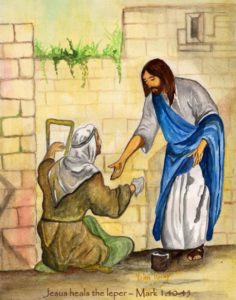
In both the Gospel of Matthew and the Gospel of Mark we have read the accounts of Jesus healing a leper and then warning him not to tell anyone, but to go show himself to the priest, “and offer for your cleansing what Moses commanded, as a testimony to them.” (Matthew 8:2-4; Mark 1:40-45; Luke 5:12-16).
The ceremonial law underscored the importance of being pronounced ‘clean’ before the Lord.
In Leviticus 14, we learn what it would have meant for that leper to satisfy the requirements of the Law and experience the joy of being pronounced ‘clean’. What good news that would be! No longer would he have to live as an outcast of society, separated from his family and perpetually kept at a distance from others. If pronounced ‘clean’, he would be fully reinstated to all the privileges of the people of the covenant.
Prior to being healed by Jesus, the leper would have had to tear his clothes, uncover his head, and with his hand over his mouth and beard, identify himself by his announcing aloud his condition, “Unclean! Unclean!” (Leviticus 13:45)
The leper was banished from his family tent and would have to live alone, ostracized outside the camp of Israel (13:46). These regulations symbolized that the leper was ritually dead.
LEPROSY REFLECTS THE CONDITION OF SIN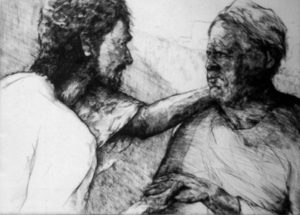
We can see that the description of this disease reflects the condition of sin. The leprosy was recognizable to the priest even if it was only yet manifested as a tiny spot on the skin or a hair in the diseased area turned white. Soon the infection could spread to cover the whole body. God recognizes sin for what it really is. It is a departure from His order. It is a sickness of the soul. It only takes one sin to make a person a sinner. The Scriptures tell us that all of us, when examined under the scrutiny of God’s Holy Light, have the incurable heart disease of sin (Jeremiah 17:9). We are all convicted as sinners under the law (Romans 3:23). The disease of sin leaves us all separated from God, and, to some degree, isolated and distant from one another. Sin has a contagious impact in society. Sin cuts us off from fellowship with God (Isaiah 59:1) and His people. Sin keeps us from the tent of meeting. Just as the leper is considered by the law of Israel as being judicially dead, the sinner is “dead in trespasses and sins” (Eph 2:1).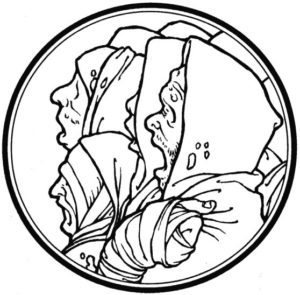
In the gospels we read of the desperation of ten lepers who called out to Jesus from a distance:
Luke 17:12-13 (NASB) 12 As He entered a village, ten leprous men who stood at a distance met Him; 13 and they raised their voices, saying, “Jesus, Master, have mercy on us!”
The only hope for these lepers was the mercy of God.
THE LAW OF THE LEPER IN THE DAY OF HIS CLEANSING
The leper’s hope, in Leviticus 14, is called “the day of his cleansing.”
Leviticus 14:1-2 (NASB) 1 Then the LORD spoke to Moses, saying, 2 “This shall be the law of the leper in the day of his cleansing.
There are two ceremonies that ratify the cleansing of the leper. One takes place outside the camp (Lev 14:2-9) and the other, in front of the tent of meeting eight days later (Lev 14:10-32).
CLEANSING OUTSIDE THE CAMP
Notice the parallels. The priest goes outside the camp. (This is a picture of Jesus going outside the camp to be identified with those condemned under the law and numbered among the transgressors. There, outside the camp, He was crucified.)
The priest goes where the leper resides. The leper cannot go to the tent of meeting. So, Christ comes to meet us where we are outside the camp. His love compels Him to go the distance. The priest leads the leper to a source of fresh ‘living’ water.
The priest takes two live birds considered ‘clean’ according to the law of Moses. One of the birds is to be killed over an earthenware vessel with its blood mixing with the fresh water. The priest would take the live bird and dip it in the vessel with the hyssop, cedar wood, and scarlet yarn.
Hyssop was the plant used for applying the blood of the Passover Lamb to the post and lintels of the Israelite homes in the final plague when the angel of death came to strike the firstborn son of any home in Egypt that did not have that protection (Exodus 12:22). When Solomon spoke wisely of all the vegetation of creation, he spoke of trees, “from the cedar to the hyssop” (1 Kings 4:33). Scarlet speaks of both the obvious nature of sin (Isaiah 1:18) and the promise of salvation (Joshua 2:18). Hyssop, cedar wood, and scarlet were put into the earthen vessel with the blood and water in a similar manner to when they were cast into the midst of the red heifer offering which we will read about in Numbers 19. Such a mixture may also be what is called ‘purifying water’ in Numbers 8:7.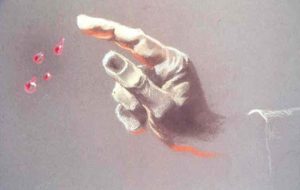
The priest sprinkles the mixture seven times on the leper who has been cleansed. The priest then pronounces him clean and lets the bird fly free in an open field. The cleansed man then washes and shaves and is restored to the camp, living outside his tent for seven days as a testimony.
The two birds represent the two natures of Christ and the two aspects of His provision in the atonement, His death for us, and His life in us. Jesus was both God and man. Both birds are designated by the Law as clean and holy. One bird was killed as a substitutionary sacrifice outside the camp, with the evidence of its shed blood being mingled with water in the earthen vessel. The bird had to be killed before the leper could be legally pronounced clean. The bird was killed at the command of God. It was in obedience that Jesus went to the cross. The bird was slain in an earthen vessel. This speaks of Jesus taking the earthen vessel of humanity for the purpose of suffering death. (Heb 2:9; 10:5).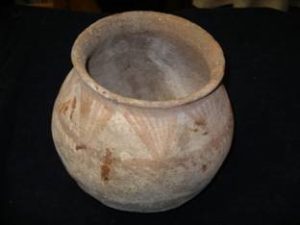
The bird was killed over ‘living’ water, fresh from a running stream, in an earthen vessel. Jesus spoke of Himself as being a source of living water. Let Him who is thirsty come to Him and drink (John 7:37-38). When Jesus died, the apostle John witnessed water and blood coming from His side (John 19:34). Water is symbolic of eternal life (John 4:14) the Word (Eph 5:24) and the Holy Spirit (John 7:38-39). Both the Word and the Spirit are living (John 6:63; Heb 4:12) and pure witnesses to the death of Christ as our perfect substitute.
The living bird would be marked with the stains of blood from the bird that was slain. The Lord Jesus rose from the dead and appeared with the marks of His death by crucifixion on His resurrection body, evident in His nail-pierced hands and wounded side (John 20:27).
The living bird once marked by death is taken to an open field to fly free. So, Jesus having died for sin, once and for all, is alive forevermore, free from the hold of death.
“He who has died is freed from sin.” (Romans 6:7)
“8 Now if we have died with Christ, we believe that we shall also live with Him, 9 knowing that Christ, having been raised from the dead, is never to die again; death no longer is master over Him. (Romans 6:8-9)
Once free, the bird took to the skies. So Jesus ascended into heaven and we eagerly await His return. (Acts 1:11)
The blood of the slain bird was sprinkled on the leper seven times. The three-letter root of the Hebrew word for seven (Sheva) is the same as the word that means ‘enough’, ‘full’, ‘plenty’, and ‘satiate’ or ‘satisfy’. It is the number standing for perfection.
The blood was applied with hyssop, as was the blood of the Passover lamb to the post and lintels of the doors of the Israelite homes in Egypt as a provision to avert the judgment of the angel of death. The use of hyssop in the Bible is a consistent type meaning ‘applying by faith’ in God’s Word. It signifies ‘believing with your heart’.
After the personal appropriation by faith of what has been provided for the cleansing of the leper, (the sprinkling of the water and the blood that testifies to the death and resurrection of the substitutionary sacrifice of Christ), the person who was judicially reckoned dead, cut off, unclean and unfit for fellowship, is legally pronounced ‘clean’.
He has witnessed both the death and the liberation of a Substitute. He has looked upon One who died for him and rose alive. Now the cleansed man is given access to his family and can enter the camp. He lives outside his tent as a testimony to the fact that He has been cleansed.
Romans 10:9 (NASB) 9 that if you confess with your mouth Jesus as Lord, and believe in your heart that God raised Him from the dead, you will be saved.
CLEANSING BEFORE THE TENT OF MEETING
On the eighth day, the first day of a new week, signifying ‘a new beginning’, the cleansed person acknowledges he is a new creation by taking two male lambs without blemish and a ewe lamb, with a grain offering mixed with oil and a log of oil. He is going to provide for four of the five major offerings (the burnt offering, grain offering, sin and trespass offering, Leviticus 1,2,4-5).
At the entrance to the tent of meeting the priest “who cleanses him” presents the man and his sacrifices before the Lord. Even though he has been cleansed, there is One who cleanses him. Christ who has cleansed us from our sin continues to keep us clean before the Lord (1 John 1:7).
One lamb is a guilt (trespass) offering belonging to the priest. The blood of the guilt offering is put on the right ear lobe, the right thumb, and the big toe of the right foot of the cleansed leper. The priest then takes some of the oil and sprinkles it with his right finger before the Lord and then he applies it to the right ear, the right hand, and the right toe, over the blood that has just been freshly applied. The blood that cleanses us is the blood that purchased, redeemed, and ransomed us. It is because of the blood (Jesus accomplishing the work of our redemption) that we can receive the anointing, the oil of the Holy Spirit.
The priest is to make atonement by offering the sin offering and then the burnt offering and the grain offering. All five offerings are involved, and the leper shall be clean.
Leviticus 14:21-32 describes a poor man’s cleansing ritual with a male lamb for a guilt offering to be waved, and its blood applied to ear, thumb, and toe, with a smaller, rationed grain offering, oil, to be sprinkled seven times before the Lord and applied to ear, thumb, and toe. For the sin and burnt offerings he can offer two turtledoves or two pigeons, “which ever he can afford”.
NEW TESTAMENT READING: Mark 6:1-29
Jesus is rejected in his hometown. He is amazed at their unbelief (Mark 6:1-6)
These people had every reason to put their trust in Jesus Christ but refused to do so. Their rejection of Him is a testimony to the deceitfulness of the unbelieving human heart.
Hebrews 3:12 12 Take care, brethren, that there not be in any one of you an evil, unbelieving heart that falls away from the living God.
A year earlier, they expelled Jesus from the local synagogue (Luke 4:16-30). Now they dismiss him, citing that he must be no more than ‘a hometown boy’, after all, “are not his brothers and sisters with us?” (6:3)
“They were offended by Him”. The Greek word for ‘offended’ is ‘skandalizo’, meaning ‘caused to stumble’. New Testament Greek scholar explains, “They could not explain Him, so they rejected Him.”
Familiarity can indeed breed contempt. Warren Wiersbe gives an insightful illustration:
A tourist, eager to see everything in the art gallery, fled from picture to picture, scarcely noticing what was in the frames. “I didn’t see anything very special here,” he said to one of the guards as he left. “Sir,” the guard replied, “it is not the pictures that are on trial here—it is the visitors.” – The Bible Exposition Commentary – New Testament, Volume 1.
There are two instances of Jesus ‘marveling’, ‘wondering’, or ‘being amazed’ (thaumazo). Here He marvels at the unbelief of those who had the Scriptures. In Luke 7:9, Jesus marvels at the great faith of the Roman centurion, who did not have the Jewish background.
Jesus sends out the twelve giving them authority to cast out evil spirits. (Mark 6:7-12) (See notes on Matthew 10- January 14).
The death of John the Baptist and the fear of Herod Antipas (Mark 6:14-29)
Because Jesus’ powerful ministry was becoming well-known, some were saying that his miraculous powers were a sign that John the Baptist had risen from the dead! Mark explains that Herod remained troubled about this and gives us a flashback to the circumstances surrounding his ordering that John the Baptist be beheaded (Mark 6:17-29)
Herod Antipas was only a tetrarch, but Mark gives him the title of King (Mark 6:14), which is the title that Herod preferred. Herod Antipas divorced the daughter of King Aretas IV so he could marry, Herodias, the wife of his half-brother, Herod Philip. It was a marriage that John the Baptist rightfully denounced as being a wicked alliance and contrary to the law of Moses.
TODAY’S READING FROM THE BOOK OF PSALMS
PSALM 39
This Psalm starts with a wise prayer request, “That I might not sin with my tongue.”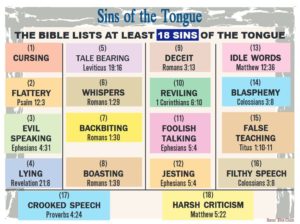
Sins of the tongue are plentiful:
The Lying Tongue- speaking false words with the intention to mislead
Proverbs 12:22 22 Lying lips are an abomination to the LORD, but those who deal faithfully are His delight.
The Boastful Tongue- The Flattering Tongue- exaggerating one’s good qualities, overly confident in oneself, exaggerating the good qualities of others to please them.
Psalm 12:3 3 May the LORD cut off all flattering lips and every boastful tongue
The Proud Tongue
Psalm 12:4 4 that says, “We will triumph with our tongues; we own our lips–who is our master?”
The swift (rash) tongue
James 1:19 19 My dear brothers, take note of this: Everyone should be quick to listen, slow to speak and slow to become angry,
The overused tongue
Ecclesiastes 5:2 2 Do not be quick with your mouth, do not be hasty in your heart to utter anything before God. God is in heaven and you are on earth, so let your words be few.
The Backbiting Tongue -talking about others behind their backs
Proverbs 16:28 28 A perverse man stirs up dissension, and a gossip separates close friends.
Romans 2:1 1 You, therefore, have no excuse, you who pass judgment on someone else, for at whatever point you judge the other, you are condemning yourself, because you who pass judgment do the same things.
The Gossiping Tongue
Proverbs 20:19 19 A gossip betrays a confidence; so avoid a man who talks too much.
The Tale-bearing, Slanderer (Mark 7:22; Ephesians 4:31; Colossians 3:8; 1 Peter 2:1)
Leviticus 19:16 16 “’Do not go about spreading slander among your people. “‘Do not do anything that endangers your neighbor’s life. I am the LORD.
The Disrespectful Tongue
1 Timothy 5:1-2 1 Do not rebuke an older man harshly, but exhort him as if he were your father. Treat younger men as brothers, 2 older women as mothers, and younger women as sisters, with absolute purity.
The Cursing, Swearing (Matt 5:33-37), profane, idle babbling tongue– James 3:10; 2 Tim 2:16-17)
Exodus 20:7 7 “You shall not misuse the name of the LORD your God, for the LORD will not hold anyone guiltless who misuses his name.
The silent tongue– not speaking when we ought to warn people of sin
Isaiah 56:10 10 Israel’s watchmen are blind, they all lack knowledge; they are all mute dogs, they cannot bark; they lie around and dream, they love to sleep.
Choose your words carefully! (James 3:4-5; Eph 4:29)
Ephesians 4:29 29 Do not let any unwholesome talk come out of your mouths, but only what is helpful for building others up according to their needs, that it may benefit those who listen.
The Psalmist benefits as he meditates upon the Lord and the meaning of life.
Notice his conclusion:
Psalm 39:7 (NASB)
7 “And now, Lord, for what do I wait? My hope is in You.
TODAY’S PROVERB- Hidden, duplicitous motives and ‘cover-up’ speech will trip you and others up.
Proverbs 10:10 10 He who winks the eye causes trouble, and a babbling fool will be ruined.
The territory of American Samoa is an unincorporated territory of the United States in the South Pacific Ocean, southeast of Samoa. It consists of 5 main islands and two coral atolls, 199 sq. kilometers (76.8 sq. miles) in the Polynesian Pacific. It is slightly larger than Washington DC. The capital is Pago Pago. The largest island is Tutuila. The current population is 55,689 people. It is the southernmost territory of the USA, and one of the two territories south of the Equator (the other being the uninhabited Jarvis Island).
There are as many Samoans living outside of American Samoa (particularly in Hawaii) than within.
It is known for its export of tuna. Its remoteness and devastating hurricanes limit economic development.
PRAY for the indigenous people and their relatives in diaspora, that they may be drawn in a whole-hearted commitment to the Lord Jesus Christ as their Savior.
The remarkable growth among cults (especially Mormons) exposes the nominalism, too-long entrenched, in the mainline churches. Pray for awakening and renewal in these rapidly declining churches.
PRAYER: O Lord, give me the grace to recognize the first sign of sin’s contamination and deal with it according to your Word. May I be proactive in the pursuit of holiness. Your grace teaches me to say ‘no’ to ungodliness. Put a bridle on my tongue and cause me to walk in a way that is pleasing to You this day. In Jesus’ Name. Amen.
Pastor David


